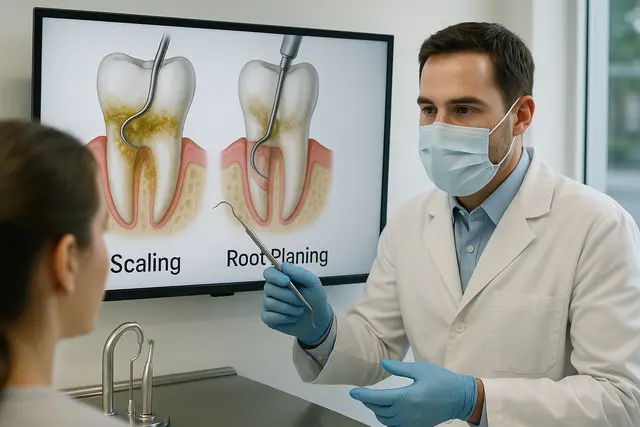General Dentistry
6 min read
Sep 03, 2025
How to Stop Tooth Bleeding: Causes and Best Treatments
A little blood in the sink can be alarming, whether it shows up after brushing, flossing, or a dental procedure. Tooth and gum bleeding often has simple, fixable causes, like irritated gums, plaque buildup, or a recently pulled tooth, and there are safe, proven steps to calm it quickly.

Ever noticed a little blood in the sink after you brush your teeth? Maybe you just had a tooth pulled and now you’re nervously checking every five minutes to see if things have gone from “a little bleed” to “panic mode.” Tooth bleeding is surprisingly common, but it doesn’t have to be scary. Whether it’s bleeding gums, blood after dental procedures, or mouth bleeding that just won’t stop, there are smart, safe ways to stop the bleeding and protect your teeth and gums for the long haul.
Understanding Why Your Mouth Might Bleed
First things first: bleeding can be caused by a whole list of things. Bleeding gums are often a sign of gum disease, gingivitis, and periodontitis, all of which start quietly along the gum line. Sometimes you’ll bleed after brushing your teeth or when you floss for the first time in weeks (no judgment). Dental injury, dental treatment, or a tooth extraction can also trigger bleeding, especially if you don’t follow proper post-extraction care.
Bleeding can also be caused by dental procedures or even something as simple as eating popcorn that scratches your gums. Bleeding after a tooth extraction is very normal in the first 24 hours after the procedure, but if bleeding is heavy or doesn’t stop, it might mean the blood can’t clot properly. There are rare bleeding disorders and medications that can prolong bleeding, so if you notice persistent bleeding, always talk to your dentist.
Dentist Knows Best: When to Seek Professional Help
Here’s the deal: while mild bleeding is usually nothing to panic about, some signs tell you it’s time to call your dentist. If the bleeding won’t stop after you apply pressure with a piece of gauze, or you notice severe bleeding hours after the procedure, don’t wait. Bleeding after a tooth extraction that soaks through gauze after several hours isn’t normal, and neither is post-extraction bleeding that soaks your pillow at night.
Contact your dentist or seek immediate emergency dental services if you experience:
A lot of blood loss
Pain and bleeding that feels intense
Swelling in the injured area
Your dentist’s office is used to calls like these, so don’t hesitate, even if it’s just for peace of mind.
Why Bleeding Gums Happen and What To Do
Bleeding gums are often a flashing warning sign from your mouth. Gum disease, gingivitis, and periodontitis can all cause bleeding from your gums, and that means bacteria is having a party where it shouldn’t. Poor oral hygiene lets plaque and tartar collect along the gum line, and the result is often bleeding gums, tenderness, or a bad taste in your mouth. Sometimes it’s as simple as brushing too hard or using a toothbrush that’s too stiff.
The best bleeding gums treatment is a mix of good oral hygiene (yes, you have to brush your teeth), regular flossing, and not skipping those dental checkups. Antibacterial mouthwashes and a saltwater rinse can also reduce bacteria and help manage bleeding from your gums. Think of this as preventive measures you can actually stick to.
If you see blood in the sink every time you brush your teeth, or your gums are bleeding without obvious reason, it’s time to get a checkup. General dentistry and periodontics have lots of treatment options that go beyond what you can do at home. Bleeding can also result from issues like vitamin K deficiency, which need real medical advice.
Dental Wisdom: What To Do After A Tooth Extraction
So, you just had a tooth pulled. Now what? Bleeding after tooth extraction is expected, but keeping that blood clot in place is your main job. If you disturb the extraction site, you can cause bleeding that’s stubborn or even dangerous. Here’s how to control bleeding and encourage the blood to clot:
Use gauze: Bite gently on a clean cloth or a piece of gauze placed directly over the bleeding site. Apply pressure for at least 30 minutes. Don’t peek every 10 seconds (we know it’s tempting).
Tea bag trick: If gauze isn’t cutting it, try a black tea bag. Tannic acid helps the blood to clot, making this a tried-and-true home remedy that’s as old as your grandma’s teapot.
Keep your head elevated: Use pillows when you lie down to reduce blood flow to your mouth.
Don’t use a straw: Using a straw can pull out the blood clot, causing more bleeding.
Spit gently: If you must spit, do it softly. Forceful spitting can knock the clot loose.
Avoid strenuous activity: Take it easy for the first 24 hours after the procedure.
Proper post-extraction care: Follow your dentist’s instructions. They know what they’re talking about.
Most mild bleeding stops with these steps to stop bleeding, but if the bleeding site continues to ooze, or you have post-extraction bleeding that doesn’t stop, it’s time to call the dentist.
Stop the Bleeding: The Best Ways to Stop the Flow
Want ways to stop tooth bleeding that actually work? Start with the basics: direct pressure with gauze. If you’re still seeing blood after 45 minutes, swap the gauze for a black tea bag. Keep your head up, and don’t rinse your mouth vigorously right away. Some people try home remedies like saltwater rinse, which can reduce bacteria and help the gums heal, but don’t do this in the first hours after the surgery unless your dentist tells you to.
Avoid using a straw, as suction can dislodge the clot and prolong bleeding. If bleeding is caused by dental injury, a clean cloth applied with gentle pressure is your first move. Keep your activity low, and avoid anything that could disturb the extraction site.
Gauze and Tea Bag: Simple Tools That Really Work
Never underestimate the power of a humble piece of gauze or a tea bag. When you apply pressure to the bleeding site, you’re giving your blood a chance to clot. For those who want a more scientific approach, hemostatic agents like aminocaproic acid or blood stopper powders (sometimes used in oral surgery or dentistry) can help control bleeding that won’t stop. Some newer products, like ankaferd, are being studied as effective ways to stop bleeding, but your dentist will know if these are right for you.
Spit, But Gently: Why Rinsing and Spitting Matter
After any dental procedure, or if your gums are bleeding, how you rinse your mouth and spit makes a huge difference. Too much force can send that hard-earned blood clot right down the drain, which is essential for healing. Instead of vigorous rinsing, a gentle approach is recommended to protect the delicate tissue.
Only rinse when your dentist or oral surgeon says it is okay, as they will provide specific instructions tailored to your situation. Using a mild saltwater solution or an antiseptic mouthwash can help keep the area clean and reduce the risk of infection. Remember, a little patience goes a long way in ensuring a speedy and successful recovery.
Preventive Measures: Habits That Keep Bleeding Away
Want to stop the bleeding before it starts? Focus on preventive measures like:
Regular checkups with your dental association-certified dentist
Keeping up with your dental care routine
Managing any health issues that could affect clotting
Eating a healthy diet that includes vitamin K
Don’t Take Chances With Your Oral Health
Most tooth bleeding isn’t a big deal, but persistent bleeding or severe bleeding after dental procedures needs professional attention. Talk to your dentist or periodontist if you’re ever in doubt. They’ll have the right treatment options, whether that’s special hemostatic agents like aminocaproic acid, blood stopper solutions, or even advanced products like ankaferd. If you need emergency dental care, don’t wait. Trust your instincts, and your dentist’s advice.
Protect your teeth and gums, follow these real-world steps to stop bleeding, and never be afraid to ask for help. Healthy smiles start with smart care, a little know-how, and maybe a tea bag or two. If you're still struggling with pain, how to stop tooth pain fast might also help.
What Causes Tooth Bleeding?
Tooth bleeding can result from several factors, including gum disease (gingivitis or periodontitis), poor oral hygiene, injury, or dental procedures such as extractions. Sometimes even brushing too hard or flossing after a long break can trigger bleeding. Certain health conditions, vitamin deficiencies, or medications that affect clotting can also prolong or worsen bleeding. Identifying the cause is essential to choosing the right treatment and preventing further oral health issues.
How Can I Stop Bleeding After a Tooth Extraction?
After an extraction, controlling bleeding is all about keeping the blood clot in place. The most effective method is applying firm pressure with gauze for at least 30 minutes. If that isn’t enough, using a damp black tea bag can help because tannic acid promotes clotting. Patients should avoid straws, spitting forcefully, or rinsing too soon, since these actions can dislodge the clot. Keeping the head elevated and avoiding strenuous activity also supports faster healing.
When Should I Call a Dentist About Bleeding?
Mild bleeding after brushing, flossing, or a dental procedure usually subsides on its own. However, you should call your dentist if bleeding continues beyond a few hours, soaks through gauze repeatedly, or is accompanied by swelling, severe pain, or signs of infection. Persistent gum bleeding without an obvious cause is another red flag, as it could signal gum disease, vitamin deficiencies, or underlying medical conditions that need professional attention.
What Are the Best Ways to Prevent Gum Bleeding Long-Term?
Preventive care is the most effective strategy. This includes brushing twice daily with a soft-bristled toothbrush, flossing regularly, and attending routine dental checkups. Using an antibacterial mouthwash or occasional saltwater rinse can reduce bacteria and inflammation along the gum line. Eating a balanced diet with enough vitamin K and avoiding habits like smoking also strengthens gum health. By maintaining consistent oral hygiene and seeking care early, you can greatly reduce the risk of bleeding gums and related complications.
Read Next
Related Posts

General Dentistry
How to Stop Nerve Pain in Tooth: Fast Relief That Works
Tooth nerve pain can be one of the most intense and disruptive types of discomfort. It often strikes without warning and makes everyday activities like eating, drinking, or even talking feel unbearable. Understanding what causes this pain and how to manage it effectively is key to getting fast relief.
4 min read
Sep 15, 2025

General Dentistry
Can a Sinus Infection Make Your Jaw Hurt? Understanding the Connection
Jaw pain can be unsettling, especially when it seems to appear out of nowhere alongside a stuffy nose or headache. Many people are surprised to learn that sinus infections can cause discomfort that feels like it’s coming from the jaw. Understanding the connection between your sinuses and jaw pain is key to getting the right treatment.
5 min read
Sep 15, 2025

General Dentistry
What Is SRP in Dentistry? A Complete Guide to Scaling and Root Planing
When it comes to dental health, most people think regular cleanings are enough to keep their smile safe. But sometimes, what’s happening below the gumline needs more attention. Scaling and root planing (SRP) is a treatment designed to address gum disease at its source, protecting both your gums and teeth from long-term damage.
5 min read
Sep 10, 2025
Don’t have time to research every dentist around you?
See why 30k+ patients trusted us